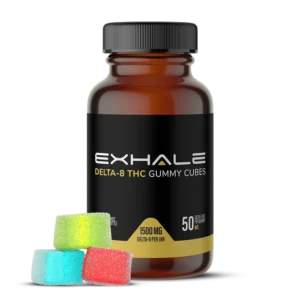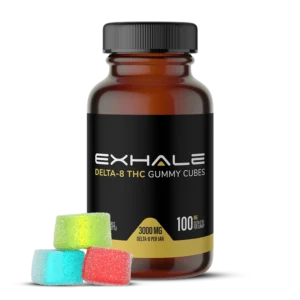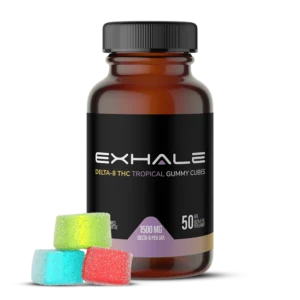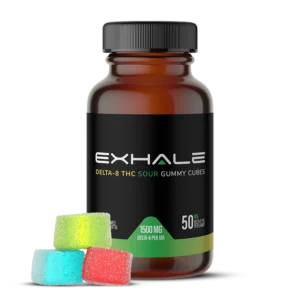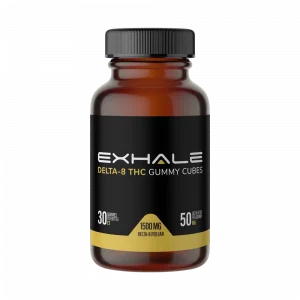Home » Delta 8 Gummies
Delta 8 Gummies
Buy Delta THC Gummies Product Online
-
Delta-8 Gummy Cubes (25mg-100mg)
$59.95 — or subscribe to save up to 30% This product has multiple variants. The options may be chosen on the product pageRated 4.86 out of 5 -
3000mg Delta 8 Gummies
$129.95 — or subscribe to save up to 30% This product has multiple variants. The options may be chosen on the product pageRated 4.78 out of 5 -
D-8/D-9/THCP Gummies – Strawnana
$89.95 — or subscribe to save up to 30% This product has multiple variants. The options may be chosen on the product pageRated 4.67 out of 5 -
1500mg Delta 8 Gummies (Tropical)
$89.95 — or subscribe to save up to 30% This product has multiple variants. The options may be chosen on the product pageRated 5.00 out of 5 -
Delta 8 THC Gummies – Sour Bear (1500mg)
$89.95 — or subscribe to save up to 30% This product has multiple variants. The options may be chosen on the product pageRated 4.95 out of 5 -
Mixed Berry Delta 8 Gummies – 1500mg
$89.95 — or subscribe to save up to 30% This product has multiple variants. The options may be chosen on the product pageRated 4.90 out of 5
Our products are Pure & Simple. Made with natural, wholesome, plant-based ingredients that put the “heal” in your health.
All of our products are tested and verified through a 3rd party to ensure accuracy. We test for potency & pesticides.
All of our products are Farm Bill-compliant, made from USA-grown hemp that contains 0.3% D9 THC or less.
We provide discreet shipping for all our products, safeguarding your purchase and protecting your privacy.
Our products are Pure & Simple. Made with natural, wholesome, plant-based ingredients that put the “heal” in your health.
All of our products are tested and verified through a 3rd party to ensure accuracy. We test for potency & pesticides.
All of our products are Farm Bill-compliant, made from USA-grown hemp that contains 0.3% D9 THC or less.

We provide discreet shipping for all our products, safeguarding your purchase and protecting your privacy.
Get $20 Off your order right now
It’s the gummies that started the Delta-8 revolution! In the summer of 2021, we launched a premium line of Delta-8 THC Gummies that changed the hemp industry forever. Featuring a variety of potencies and flavorful, all-natural blends, our soft chews quickly became best-rated Delta-8 edibles online.
What are Delta 8 Gummies?
Delta 8 THC gummies are bite-sized edible soft chews that contain a predosed amount of hemp-derived Delta-8 THC distillate. You can find them in various shapes and sizes. Gummy cubes are the most common form. They also come in a variety of delicious fruit flavors and potencies. Gummies offer a convenient, hassle-free way of receiving the benefits of Delta-8 THC.
High-quality D8 THC gummies contain natural, plant-based ingredients. You also won’t find any artificial ingredients in them. Premium Delta-8 THC gummies are also ethically sourced. Instead of animal derivatives like gelatin, they contain vegan-friendly alternatives like pectin.
Legal D8 gummies will be fully Farm Bill-compliant. This means they are made from hemp and contain no more than 0.3% THC.
Delta-8 THC gummies come in various flavors and strengths. Choose from multiple flavors in a bottle to single-flavor varieties. You can also find Delta-8 THC gummies in cannabinoid blends. This is a recent trend in the hemp industry, where gummies contain more than one cannabinoid for more balancing effects.
Ethically sourced, suitable for all dietary preferences, available in various formulations, convenient, and legal. That’s what you can expect from true top-shelf D8-THC gummies like the ones we sell here at Exhale Wellness.
What is Delta 8 THC?
You might be wondering what exactly Delta-8 THC is. It’s a naturally occurring hemp plant cannabinoid that produces mild, calming euphoria and soothing relaxation. The cannabinoid’s tranquilizing effects are best suited for evening and nighttime consumption. For many enthusiasts, Delta-8 THC is the perfect cannabinoid to de-stress, unwind, or ease deep, restful sleep.
Delta-8 THC (Delta-8 Tetrahydrocannabinol, Delta-8, D8, or D8 THC) is extremely rare in nature, with trace amounts existing in the hemp plant. Fortunately, CBD (Cannabidiol), the main cannabinoid in hemp, has a similar chemical structure to Delta-8 THC. The safe and clean process of isomerization converts CBD into abundant amounts of Delta-8 for use in consumer products.
Benefits and Effects of Delta 8 THC Gummies
There are several ways Delta-8 THC gummies can impact your health and wellness. The benefits take about 45-60 minutes to take effect, and they will last anywhere from six to eight hours.
So, what can you expect from D8 gummies? Here are the most commonly reported benefits from enthusiasts. You may experience some or all of these and more!
Mild, Calming Euphoria
Unlike Delta 9 THC, Delta-8 delivers more subdued euphoria. Expect a more controlled, calming experience. Enthusiasts appreciate the subtle lift that allows them to do the opposite — calm down and relax. This makes Delta 8 THC products the perfect evening treat or nightcap to wind down a busy day.
Alleviating Anxiousness & Stress
Have you ever experienced those moments when all you want to do is shut the world off and escape? When anxiousness and stress hit, take a Delta-8 gummy. The long-lasting relief you receive will allow you to de-stress and chill out. The soothing euphoria will help release tension and calm racing thoughts. You’ll feel as if you’re lounging on a comfy couch at your vacation retreat without a worry in the world.
Reducing Physical Discomfort
Whether it’s post-workout soreness, muscle tension from sitting in the office all day, or joint problems that hamper your mobility, Delta-8 can help soothe what ails you. Gummies provide up to eight hours of soothing full-body relief. You’ll feel every fiber of your body loosen up, delivering relief when you need it most.
Creating Moments of Tranquility
Want to get away for a while? Give yourself a vacation any time of day by boarding Delta-8 Airlines! You’ll set a course to a private island of mental clarity and soothing physical relief. Ultimate mind-body relief awaits as Delta-8 THC works its magic to deliver vacation-level relaxation whenever you need it.
Promoting Better Sleep
Stop relying upon dangerous levels of caffeine beverages and sugar-loaded energy drinks to get you through the day. Fix the real problem: poor sleep. One Delta-8 hemp gummies at night is all it takes to provide a deeper, more restful sleep. You’ll wake up feeling refreshed and ready to tackle the day.
Finding the Perfect Delta-8 THC Gummies
Don’t just settle for any Delta-8 gummy. Get the best. Here’s a list of five important things to look for when assessing the quality of Delta gummy.
High-Quality Ingredients
Our Delta-8 THC Gummies are made from high-quality ingredients. Choose gummies made from all-natural, plant-based, cruelty-free sources. Ensure there are no artificial ingredients of any kind.
Farm Bill-Compliant
The 2018 Farm Bill paved the way for hemp and hemp-derived products to be federally legal. All hemp products must contain no more than 0.3% THC on a dry-weight basis. Make sure the Delta-8 soft chews you want to enjoy are Farm Bill-compliant.
Third-Party Lab Reports
A great way of determining the quality of your gummies is to check whether or not they come with a Certificate of Analysis (COA). A COA is an authenticated lab test result from an independent laboratory that verifies the contents of a cannabis product.
Reputable brands provide COAs for all of their products. A COA signifies a legitimate product and instills faith in consumers that they are purchasing a quality product. At Exhale Wellness, we provide COAs for all products, including our Delta-8 THC Gummies.
Verified Customer Reviews
Customers know a good product when they try one. So, look for honest feedback about the gummies you want to buy by reading verified reviews. Do your research and get a good sample of reviews from various sources, including the company’s product page.
Quality Packaging
Premium gummies typically come in premium packaging. Examine the packaging to ensure that it provides an adequate seal to prevent contamination. Make sure the packaging is also light-resistant to prevent degradation of the gummies. Finally, look at the labeling. The labeling should be clear and easy to read.
Delta 8 THC Gummies: Direction To Use
As a general rule of thumb, follow the dosing instructions on the packaging to ensure a positive experience. The typical dosage, regardless of strength, is one gummy. If this is your first time, take half a gummy.
Always start with a low dose. Take it slow. Wait to see how Delta-8 THC affects you. If you feel the effects are not quite to your liking, take another small dose. The key to a positive Delta-8 dosing experience is to start low and go slow.
It’s important to understand that not all D8-THC gummy experiences are the same. Factors such as age, weight, metabolism, body chemistry, prior experiences, tolerance, stomach contents, and medical history play a role in how Delta-8 affects you.
Below is a chart of the general dosing of Delta-8 gummies. These are merely suggestions, so like we mentioned before, start slow, go slow, wait and see, and proceed further if need be. Always practice responsible consumption.
|
Experience Level |
Low Tolerance |
Medium Tolerance |
High Tolerance |
|
Beginner |
5 mg |
10 mg |
15 mg |
|
Casual Consumer |
15 mg |
30 mg |
45 mg |
|
Experienced Consumer |
45 mg |
90 mg |
150 mg |
Why Choose Exhale Wellness for Best Delta-8 Gummies
Looking to buy the best Delta-8 THC Gummies online? There’s only one place to be, and you’re already here! Exhale Wellness burst onto the D8 scene in 2021. The quality, potency, and taste of our Delta 8 Gummies became an instant hit with enthusiasts and newcomers, cementing us as the top Delta-8 gummies brand in the United States!
Since then, we’ve honed our craft and expanded our Delta 8 offerings. We’ve added more flavors and potencies to our lineup of Delta-8 THC Gummies. Below are the highlights that makes our D8 soft chews great?
Plant-Based, Cruelty-Free & Guilt-Free!
We only use clean, pure, and natural ingredients. Ethical sourcing from organic and renewable resources separates our Gummies from other brands. Expect only plant-based and cruelty-free ingredients in all formulations for the best taste and a guilt-free experience.
Lab-Tested & Pure
We send every batch of our D8 Gummies to third-party laboratories for thorough testing. You can rest assured that our edibles are as pure and potent as possible.
What you read on the label is what’s in every gummy. No filler, additives, or preservatives — just pure, all-natural Delta THC bliss! You can view the COAs right here on our website
Premium Products Without the Premium Price
We make our hemp-based delta-8 thc edibles in the United States with American-grown hemp. We source from legendary hemp farms that have mastered the art of growing cannabis. The attention to detail and sourcing high-quality ingredients to make our Gummies ensures you get the best possible product for your money.
We care about our customer base and want them to experience plant-based wellness so they can live their best lives. That’s why we offer competitive prices so everyone can benefit from Delta-8 and other cannabinoids.
Fast Shipping & 24/7 Customer Support
When you’re done shopping our extensive online collection, expect your purchase to arrive at your doorstep very soon! Our fast shipping promises no hassle in delivering your goods so you can receive the wellness benefits you deserve.
If you have any questions or concerns about our products or your order, feel free to contact us anytime. We’ll respond promptly!
Are Delta-8 THC Gummies Legal?
Yes, hemp-derived Delta-8 gummies are federally legal as long as they contain 0.3% or less THC. Although hemp and hemp products are legal at the federal level, certain states may have their own regulations. Before purchasing, please check your state’s laws regarding hemp and Delta 8 products.
Where Are Delta-8 Available in USA Online
Delta-8 THC gummies are available online and can be shipped to numerous states across the USA. However, the legality varies by state, so it’s crucial to check the latest regulations. These gummies are legally available in states like Alabama, Florida, Georgia, Indiana, Kentucky, Maryland, Massachusetts, Minnesota, Missouri, Nebraska, New Jersey, North Carolina, Ohio, Oklahoma, Pennsylvania, South Carolina, Tennessee, Texas, Virginia, Washington, West Virginia, Wisconsin, and Wyoming.
*Always verify with the FDA and state authorities for the current legal status.
FAQs on Delta-8 Gummies
How Often Should I Eat Delta-8 THC Gummies?
You can consume Delta-8 THC gummies as needed. Start with one gummy and wait to see how it affects you. Adjust the dosage and frequency based on your needs.
How Long Will It Take for Delta-8 Gummies To Work?
Delta-8 THC gummies typically take between 45-60 minutes to work. Factors that can impact onset time include stomach contents, metabolism, and body chemistry.
How Long Does Delta-8 Gummies Stay in the System?
Delta-8 THC can stay in your system for up to 30 days. However, the amount of time D8 edibles stay in your system depends on several factors, such as frequency of consumption, dosage, metabolism, and body chemistry. Also, the type of drug test and the sample to be collected (i.e., urine, blood, hair, etc.) plays a role, too.
Can I Buy Delta 8 Edibles Online?
Yes, you can buy D8 THC gummies online. Shopping online for D8 THC gummies is usually the best option because you have access to a company’s entire products. You also don’t have to deal with pushy salespeople, worry about items not being in stock, or drive to a physical store.
How Much THC Is in Delta-8 Gummies?
Legal D8 THC gummies must contain no more than 0.3% THC. This is a stipulation that all hemp-derived products must meet.
How Should I Take Delta-8 Gummies?
Taking Delta-8 THC gummies is very easy. Just take one gummy, put it in your mouth, chew, swallow, and that’s it! Start with one gummy, assess how you feel, and adjust as needed.
How Long Do D8 Gummies Show up on a Drug Test?
Depending on the type of drug test, D8 THC gummies can be detected up to 30 days after consumption. Frequency of consumption, dosage, and metabolism also affect the detection windows.
How Do You Store Delta-8 Gummies?
Store D8-THC gummies in their original packaging in a cool, dry place away from exposure to heat and direct sunlight. Make sure you store the gummies in a location that children or pets cannot access.
